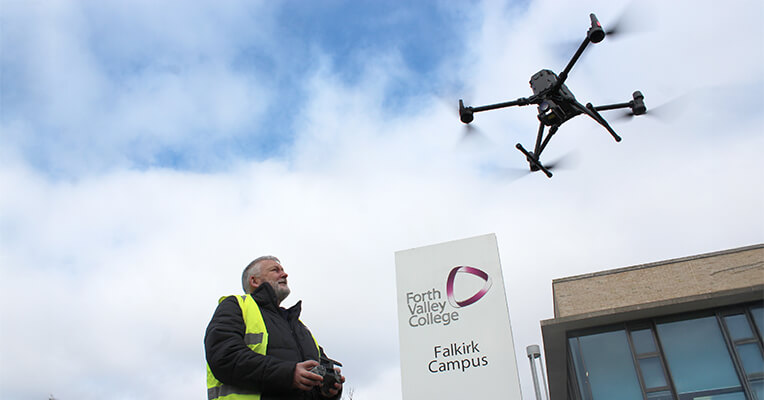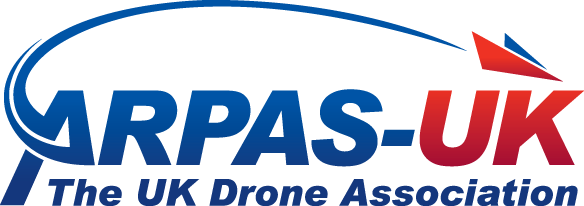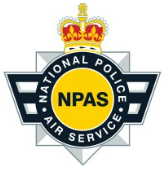Forth Valley College (FVC) has launched Scotland’s first ECITB Industrial Uncrewed Aircraft Systems (UAS) Operations: Foundation Training Course, marking a significant advancement in industrial drone training. This pioneering five-day program, hosted at FVC’s Falkirk Campus, is designed to enhance drone operation skills for industrial applications, including infrastructure inspections, site surveys, and data capture.
Course Development and Industry Collaboration
The course was developed in collaboration with industry leaders, notably Sellafield Ltd, to establish a new standard for uncrewed aircraft operations in complex engineering and construction environments. Amanda Smith, UAV Equipment Programme Lead at Sellafield, emphasized the course’s value: “Having this new standard means if someone comes to us with this ECITB qualification, I understand the standard of the training they’ve got, which saves time on internal assessments.”
Course Objectives and Structure
The ECITB Foundation UAS training course aims to bridge the gap between basic drone flying and specialized, high-risk industrial applications. It is ideal for experienced drone pilots transitioning to multi-sector operations or companies seeking to upskill employees. The course equips participants with both theoretical knowledge and practical expertise.

Theoretical Modules:
- Platform: Understanding drone types and capabilities.
- Path: Flight planning and navigation.
- People: Safety, crew coordination, and risk management.
- Procedures: Operational guidelines and compliance.
- Planning: Risk assessment and mission preparation.
Practical Training Includes:
- Precise drone control in varying conditions.
- Flying near structures safely and effectively.
- Capturing high-quality industrial data.
- Managing data securely in line with site protocols.
Upon successful completion, participants receive ECITB Certification, an industry-recognized benchmark for pilot competency.
Industry Perspectives
Chris Mann, ECITB’s Director of Learning and Assurance, highlighted the course’s benefits: “The use of drones across industrial settings, particularly for maintenance inspections, offers real benefits to industry, including increased worker safety and efficiency as well as a reduction in asset downtime.”
Zak Stark, FVC’s Head of Commercial Training, emphasized the course’s alignment with industry needs: “As industry demand for drone technology continues to grow, this course ensures that companies have access to an industry benchmark for pilot competency and subsequently highly skilled pilots who can meet stringent operational and safety standards.”
Role of ARPAS-UK and Pravo Consulting
ARPAS-UK has been instrumental in supporting the safe adoption of drones across various sectors. They have collaborated with specialists to deliver Continuing Professional Development (CPD) sessions relevant to multiple industries.
Pravo Consulting, represented by Philip Hicks, has been involved in preparatory discussions for this inaugural education program. Their collaboration with Graham Brown at ARPAS-UK and Jamie Allan and the team in Scotland has been pivotal in shaping the course to meet industry standards and requirements.
Economic Impact of Drone Technology
The integration of drones into industrial operations is projected to have substantial economic benefits. According to PwC’s “Skies Without Limits” report, drones could add £42 billion to the UK GDP by 2030, with 76,000 drones operating in UK skies and a total of 628,000 jobs in the drone-related economy. The report also predicts £3.5 billion in cost savings from drone uptake in the construction and manufacturing sectors.
Future Prospects
The launch of the ECITB Industrial UAS Operations: Foundation Training Course at Forth Valley College sets a precedent for drone training in the UK. It addresses the growing demand for skilled drone operators capable of performing complex tasks in industrial environments. As industries continue to adopt drone technology, such training programs will be crucial in ensuring safety, efficiency, and adherence to regulatory standards.
For more information about the course, interested parties can contact Forth Valley College at [email protected].
In conclusion, the collaboration between Forth Valley College, ECITB, ARPAS-UK, Pravo Consulting, and industry leaders like Sellafield Ltd exemplifies a proactive approach to integrating emerging technologies into industrial practices. This initiative not only enhances the skill set of drone operators but also contributes to the broader goal of modernizing industrial operations through innovative solutions.
Read more:
- ECITB Foundation UAS Training Course – ARPAS UK
- Drones in Construction, Mapping & Surveying webposts
- Drones in Academia
11 March 2025











